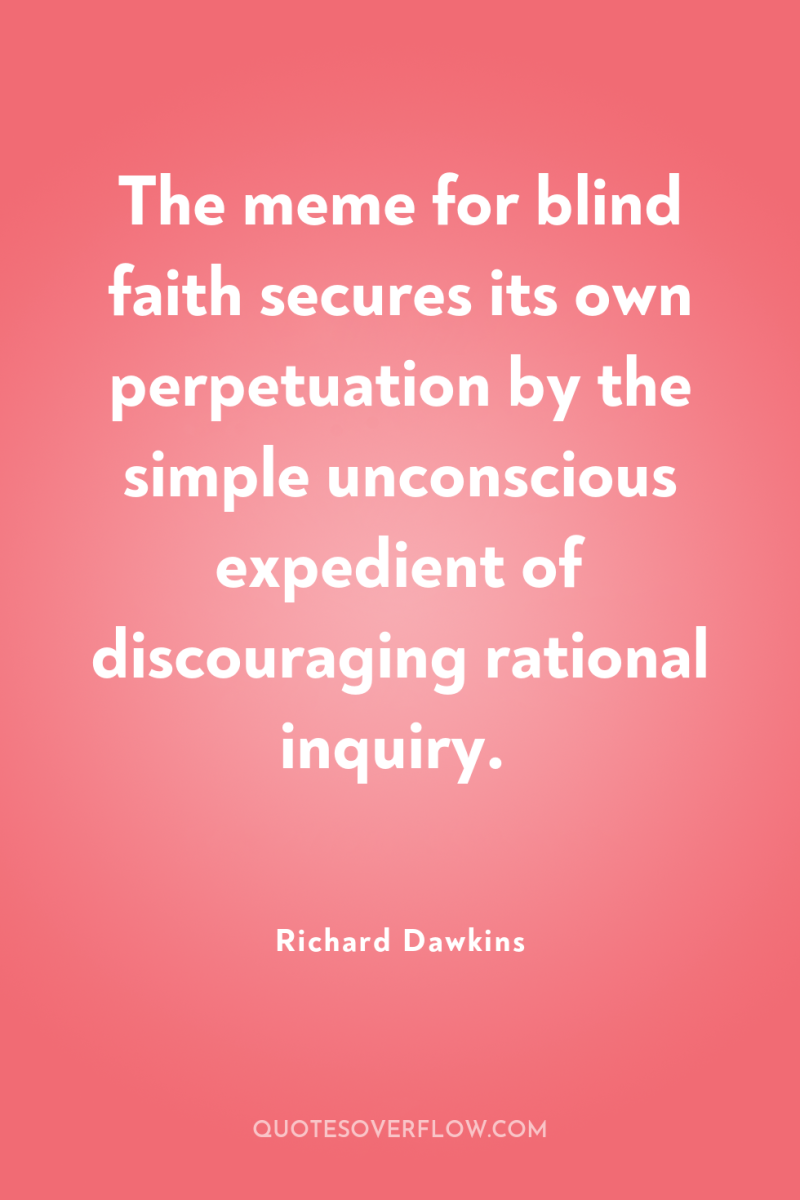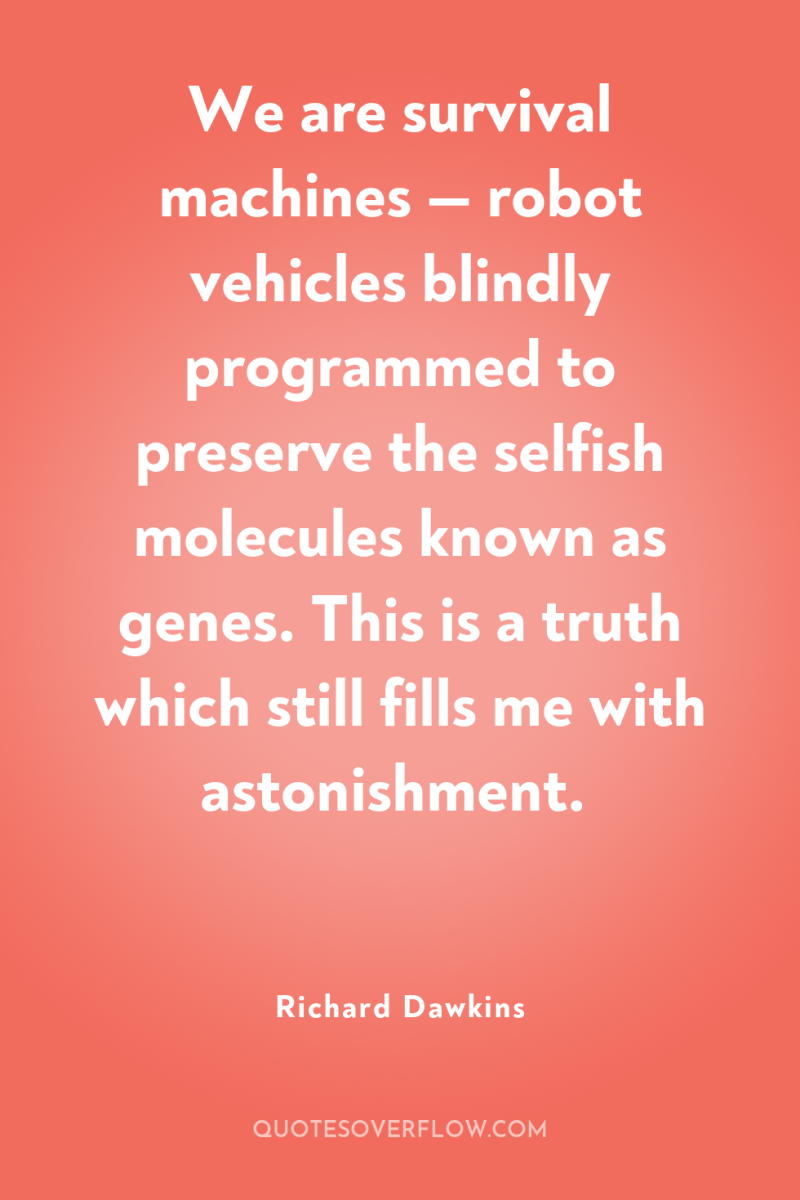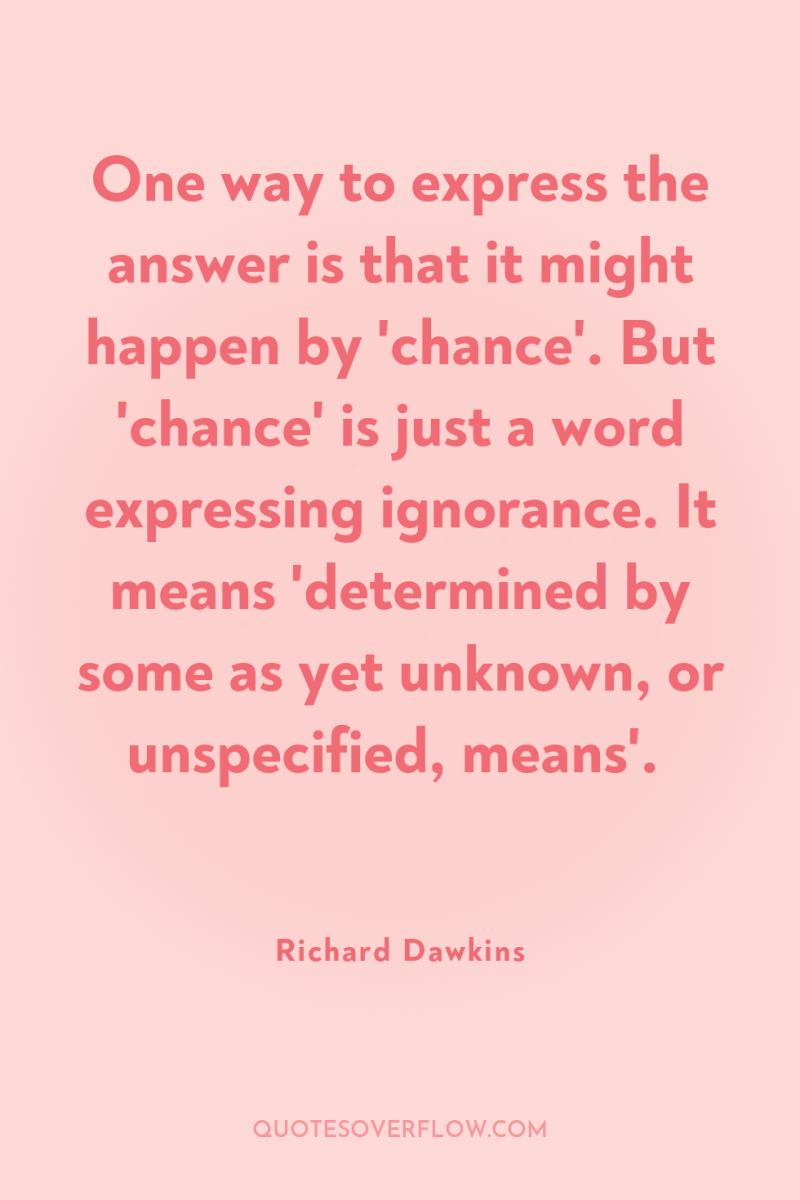1
Let us try to teach generosity and altruism, because we are born selfish. Let us understand what our own selfish genes are up to, because we may then at least have the chance to upset their designs, something that no other species has ever aspired to do.Richard Dawkins

2
The meme for blind faith secures its own perpetuation by the simple unconscious expedient of discouraging rational inquiry.Richard Dawkins

3
We are survival machines — robot vehicles blindly programmed to preserve the selfish molecules known as genes. This is a truth which still fills me with astonishment.Richard Dawkins
4
Individuals are not stable things, they are fleeting. Chromosomes too are shuffled into oblivion, like hands of cards soon after they are dealt. But the cards themselves survive the shuffling. The cards are the genes. The genes are not destroyed by crossing-over, they merely change partners and march on. Of course they march on. That is their business. They are the replicators and we are their survival machines. When we have served our purpose we are cast aside. But genes are denizens of geological time: genes are forever. .Richard Dawkins
5
Human suffering has been caused because too many of us cannot grasp that words are only tools for our use. The mere presence in the dictionary of a word like 'living' does not mean it necessarily has to refer to something definite in the real world.Richard Dawkins
6
Presumably there is indeed no purpose in the ultimate fate of the cosmos, but do any of us really tie our life's hopes to the ultimate fate of the cosmos anyway? Of course we don't; not if we are sane. Our lives are ruled by all sorts of closer, warmer, human ambitions and perceptions.Richard Dawkins
7
Different sorts of survival machine appear very varied on the outside and in their internal organs. An octopus is nothing like a mouse, and both are quite different from an oak tree. Yet in their fundamental chemistry they are rather uniform, and, in particular, the replicators that they bear, the genes, are basically the same kind of molecule in all of us–from bacteria to elephants. We are all survival machines for the same kind of replicator–molecules called DNA– but there are many different ways of making a living in the world, and the replicators have built a vast range of machines to exploit them. A monkey is a machine that preserves genes up trees, a fish is a machine that preserves genes in the water; there is even a small worm that preserves genes in German beer mats. DNA works in mysterious ways.Richard Dawkins
8
Prediction in a complex world is a chancy business. Every decision that a survival machine takes is a gamble, and it is the business of genes to program brains in advance so that on average they take decisions that pay off. The currency used in the casino of evolution is survival, strictly gene survival, but for many purposes individual survival is a reasonable approximation.Richard Dawkins

9
One way to express the answer is that it might happen by 'chance'. But 'chance' is just a word expressing ignorance. It means 'determined by some as yet unknown, or unspecified, means'.Richard Dawkins
10
Chance" is just a word expressing ignoranceRichard Dawkins
11
I am an enthusiastic Darwinian, but I think Darwinism is too big a theory to be confined to the narrow context of the gene.Richard Dawkins
12
It requires a deliberate mental effort to turn biology the right way up again, and remind ourselves that the replicators come first, in importance as well as in history.Richard Dawkins
13
All life evolves by the differential survival of replicating entitiesRichard Dawkins
14
What, after all, is so special about genes? The answer is that they are replicators. The laws of physics are supposed to be true all over the accessible universe. Are there any principles of biology which are likely to have similar universal validity? When astronauts voyage to distant planets and look for life, they can expect to find creatures too strange and unearthly for us to imagine. But is there anything which must be true of all life, wherever it is found, and whatever the basis of its chemistry? If forms of life exist whose chemistry is based on silicon rather than carbon, or ammonia rather than water, if creatures are discovered which boil to death at -100 degrees centigrade, if a form of life is found which is not based on chemistry at all, but on electronic reverberating circuits, will there still be any general principle which is true of all life? Obviously I do not know but, if I had to bet, I would put my money on one fundamental principle. This is the law that all life evolves by the differential survival of replicating entities. The gene, the DNA molecule, happens to be the replicating entity which prevails on our own planet. There may be others. If there are, provided certain conditions are met, they will almost inevitably tend to become the basis for an evolutionary process.Richard Dawkins
15
The essential quality that an entity needs, if it is to become an effective gene vehicle, is this. It must have an impartial exit channel into the future, for all the genes inside it. This is true of an individual wolf. The channel is the thin stream of sperms, or eggs, which it manufactures by meiosis. It is not true of the pack of wolves. Genes have something to gain from selfishly promoting the welfare of their own individual bodies, at the expense of other genes in the wolf pack. A bee-hive, when it swarms, appears to reproduce by broad-fronted budding, like a wolf pack. But if we look more carefully we find that, as far as the genes are concerned, their destiny is largely shared. The future of the genes in the swarm is, at least to a large extent, lodged in the ovaries of one queen. This is why–it is just another way of expressing the message of earlier chapters–the bee colony looks and behaves like a truly integrated single vehicle. .Richard Dawkins
16
What shall it profit a male if he shall gain the whole world, and lose his immortal genes?Richard Dawkins
17
It does not seem ever to have been satisfactorily answered why the two first operational atomic bombs were used–against the strongly voiced wishes of the leading physicists responsible for developing them–to destroy two cities instead of being deployed in the equivalent of spectacularly shooting out candles.Richard Dawkins
18
Consider again the mated pair with which we began the chapter. Both partners, as selfish machines, ‘want’ sons and daughters in equal numbers. To this extent they agree. Where they disagree is in who is going to bear the brunt of the cost of rearing each one of those children. Each individual wants as many surviving children as possible. The less he or she is obliged to invest in any one of those children, the more children he or she can have. The obvious way to achieve this desirable state of affairs is to induce your sexual partner to invest more than his or her fair share of resources in each child, leaving you free to have other children with other partners. This would be a desirable strategy for either sex, but it is more difficult for the female to achieve. Since she starts by investing more than the male, in the form of her large, food-rich egg, a mother is already at the moment of conception ‘committed’ to each child more deeply than the father is. She stands to lose more if the child dies than the father does. More to the point, she would have to invest more than the father in the future in order to bring a new substitute child up to the same level of development. If she tried the tactic of leaving the father holding the baby, while she went off with another male, the father might, at relatively small cost to himself, retaliate by abandoning the baby too. Therefore, at least in the early stages of child development, if any abandoning is going to be done, it is likely to be the father who abandons the mother rather than the other way around. Similarly, females can be expected to invest more in children than males, not only at the outset, but throughout development. So, in mammals for example, it is the female who incubates the foetus in her own body, the female who makes the milk to suckle it when it is born, the female who bears the brunt of the load of bringing it up and protecting it. The female sex is exploited, and the fundamental evolutionary basis for the exploitation is the fact that eggs are larger than sperms. .Richard Dawkins
19
We have looked at some of the things that a female might do if she has been deserted by her mate. But these all have the air of making the best of a bad job. Is there anything a female can do to reduce the extent to which her mate exploits her in the first place? She has a strong card in her hand. She can refuse to copulate. She is in demand, in a seller's market. This is because she brings the dowry of a large, nutritious egg. A male who successfully copulates gains a valuable food reserve for his offspring. The female is potentially in a position to drive a hard bargain before she copulates. Once she has copulated she has played her ace – her egg has been committed to the male. It is all very well to talk about driving hard bargains, but we know very well it is not really like that. Is there any realistic way in which something equivalent to driving a hard bargain could evolve by natural selection? I shall consider two main possibilities, called the domestic-bliss strategy, the he-man strategy. The simplest version of the domestic-bliss strategy is this. The female looks the males over, and tries to spot signs of fidelity and domesticity in advance. There is bound to be variation in the population of males in their predisposition to be faithful husbands. If females could recognize such qualities in advance, they could benefit themselves by choosing males possessing them. One way for a female to do this is to play hard to get for a long time, to be coy. Any male who is not patient enough to wait until the female eventually consents to copulate is not likely to be a good bet as a faithful husband. By insisting on a long engagement period, a female weeds out casual suitors, and only finally copulates with a male who has proved his qualities of fidelity and perseverance in advance. Feminine coyness is in fact very common among animals, and so are prolonged courtship or engagement periods. As we have already seen, a long engagement can also benefit a male where there is a danger of his being duped into caring for another male's child.Richard Dawkins